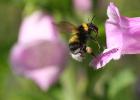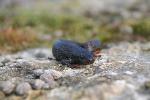Ecological emergency
On 6 April 2022, the council's Cabinet declared a countywide ecological emergency in response to the alarming decline in habitat and species diversity. Recognizing the urgent need for action, the council developed an Ecological Emergency Action Plan that outlines how our services will address this critical issue.
The plan emphasizes the importance of reviewing and managing our land assets to promote and implement best ecological practices. It identifies specific areas for action, assigns service leads, and considers resource implications and targets to ensure we effectively respond to this ecological crisis. This plan represents our commitment to safeguarding and restoring our natural environment for future generations.
Experts say that since 1970 there has been a 68% decrease in population sizes of mammals, birds, amphibians, reptiles, and fish across the globe and in the UK 15% of species are threatened with extinction.
County Durham inhabits a wide and diverse range of landscape and wildlife, from the blanket bogs and heather of the uplands with iconic species such as the Black Grouse, through the mixed farmland of the Durham Coalfield with remnant ancient woodland and hedgerows to the magnesium limestone grasslands of the coast, home to species such as the Northern Brown Argus and Little Tern.
County Durham is also home to the North Pennines National Landscape and internationally designated sites including the Moorhouse and Upper Teesdale National Nature Reserve and Durham Coast.
Timeline of progress
In 2018, the Government published its 25 Year Environment Plan, setting out its ambition to improve the natural environment. More recently, it announced a 'state of nature' target aimed at halting the decline in nature in England by 2030 and has plans to implement a number of environmental policies to achieve these goals including:
- establishing Local Nature Recovery Strategies (LNRS)
- biodiversity net gain for new developments
- a Nature Recovery Network
- the proposal to protect 30% of the land area for nature by 2030 (the so called '30 x 30' commitment).
These go alongside supporting nature-based solutions to climate change like tree planting and protecting and restoring peatland. The UK is also leading the Global Ocean Alliance to protect at least 30% of the global ocean by 2030.
In March 2019, we declared a climate emergency and quickly prepared an emergency response plan. This plan continues to evolve and develop as the council focuses on its carbon commitment targets. Climate change can overwhelm the capacity of ecosystems to mitigate extreme events and disturbance, such as wildfires, floods, and drought. Due to this, the important conversation of the ecological emergency was raised.
On 22 September 2021, at a meeting of the council, a question was raised seeking Cabinet's view on the declaration of an ecological emergency in County Durham. Arguments were presented for both declaring an ecological emergency and preparing ecological emergency action plan to add to the existing climate emergency response plan.
Our approach
The council is responsible for leading on the production of the LNRS. The LNRS will guide and focus funding from a range of sources, including the government's Biodiversity Net Gain policy and Environmental Land Management schemes (ELM), as well as other potential cross-sector and private funding opportunities, such as those for woodland creation, natural flood management, and species conservation projects.
The LNRS will be specific and tailored to County Durham. We can choose how we want it to look, and agree priorities for nature's recovery, map the most valuable existing areas for nature and have specific proposals for creating or improving habitats for nature and wider environmental goals.
Our ecological emergency action plan in conjunction with the LNRS will offer a clear roadmap for how we can encourage nature recovery in County Durham. By implementing tailored strategies and collaborating across sectors, we can help halt and reverse the loss of habitats and species.
The actions we take now will be critical in ensuring a thriving natural environment for future generations, supporting not only wildlife but the health and wellbeing of our communities. Together, we can restore nature, protect our ecosystems, and secure a sustainable future for the county and beyond.
We depend on nature to sustain our lives, from the street trees outside our homes to the woodlands and wetlands in our nature reserves. Nature provides us with essentials like food, water, carbon storage, and clean air. Spending time in nature, whether in a local park or the countryside, helps us stay physically and mentally healthy.
However, England is widely regarded as one of the most nature-depleted countries in the world, and County Durham has not been spared from this decline. Our natural environment has deteriorated due to various factors, including pollution, pesticide use, invasive non-native species, the loss of traditional land management practices, and climate change.

In partnership with
- Climate County Durham






 Share this page on Facebook
Share this page on Facebook
 Share this page on Twitter
Share this page on Twitter
 Print this page
Print this page





